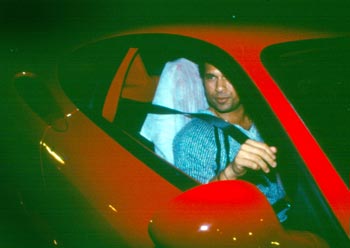
On April 19, 2002, Sachin Tendulkar equaled the great Don Bradman's feat of scoring 29 centuries in Test cricket at Port of Spain. To commemorate the occasion, automotive giant Ferrari invited the master batsman to its paddock in Silverstone on the eve of the British Grand Prix in July. The batting ace was also gifted a Ferrari 360 Modena from legendary Formula One driver Michael Schumacher.
In September the same year, Tendulkar applied for exemption from customs duty and India's then Finance Minister Jaswant Singh wrote back to the Mumbai batsman telling him that the government would waive the duty imposed on importing the car in appreciation of his recent feat.
But it was in sharp contrast to the existing rules, which stated that customs duty can be waived only when receiving an automobile as a prize and not as a gift.
It is claimed that the proposals to change the law (Customs Act) were put forth in the Financial Bill in February 2003, amended and passed as a law in May 2003. Subsequently, the Ferrari was allowed to be brought to India without payment of the customs duty, which amounted to Rs 1.13 crore or 120 per cent of the car value of Rs 750,000.
However, when the move to waive customs duty became public in July 2003, there was a huge outcry in India with huge protests against the waiver. There was also a PIL filed in the Delhi high court, which questioned how the duty was waived.
With the controversy becoming a huge issue, Tendulkar promptly offered to pay the customs duty. Fiat, owners of Ferrari, stepped in and agreed to pay the import duty and thereby brought an end to the controversy.
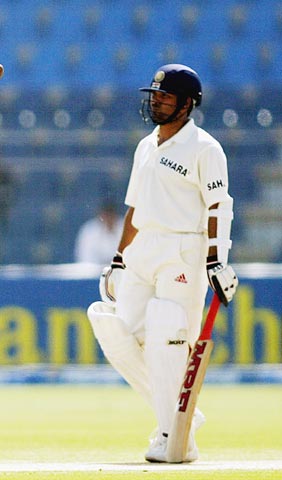
Sachin Tendulkar looked set for his second consecutive double century before the unexpected happened. Captain Rahul Dravid declared the Indian innings, leaving the master batsman stranded on 194 not out in the first Test against Pakistan in Multan.
Addressing the media at the end of the day's play, Tendulkar made his disappointment clear. "Obviously, I'm a little disappointed, having got so close," he said.
"I was aware that the declaration was just around the corner, but when it came, I was taken by surprise. The plan was to put them in for an hour or so. We were playing very positively at the time ... a run-rate of four-an-over is very good in Test cricket. But when Yuvraj got out, I saw Rahul [Dravid] calling us in."
Dravid came in for a lot of criticism from former cricketers, Indian fans and a section of the Indian media. And with the match ending in four days, he was made to rue his decision further.
Later it was revealed that regular captain Sourav Ganguly had signalled the declaration before stand-in captain Dravid waved to Tendulkar to return to the pavilion.
However, India coach John Wright put an end to the controversy when he along with Dravid and Tendulkar addressed the media after the victory. They all came together and declared that the matter was discussed internally and put to rest!
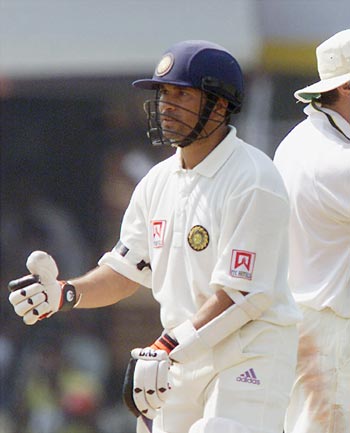
Sachin Tendulkar is revered and worshipped by cricket fans throughout the world. But there was a day when it all came crashing down.
The maestro was booed by his own fans at the Wankhede stadium in Mumbai in March 2006 after getting out.
After an unconvincing 1 off 21 balls against England in the first innings of the third Test, Tendulkar was booed by a section of the crowd as he walked off the ground; it was the first time that he experienced such hostility at any venue in the world.
India went on to lose the Test by a huge margin of 212 runs as England leveled the three-match series 1-1.
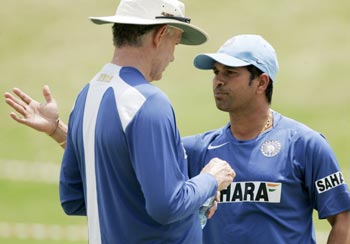
For the first time an Indian coach went on to slam Tendulkar, saying his attitude was a problem. It was the explosive Greg Chappell who lashed out against the master batsman in his report to the Board of Control for Cricket in India before the 2007 World Cup. Chappell also felt that Tendulkar would be more useful down the order.
Tendulkar then came down heavily on the Australian, saying he was disappointed and hurt by his attitude being questioned by the coach.
The veteran batsman said no coach could ever suggest that his attitude towards cricket is incorrect.
However, the BCCI did not let the master batsman get away lightly. It issued him a notice, asking an explanation for his comments to the media.
"I am shattered beyond words and I feel helpless. I've never felt so bad in my entire career. World Cup was our passion, our collective dream. Tell me, even as the world goes on talking about our defeat at the World Cup, has anyone spared a thought to ask what we are going through?" he allegedly told a newspaper.
However, a few days later, in a television interview, he denied saying all that, insisting his comments against Chappell were mere rumours.
At the 2007 World Cup in the West Indies, India was knocked out in the group stages and Tendulkar took most of the blame after a poor series with the bat. Forced to bat lower down the order by coach Chappell, Tendulkar had scores of 7 (Bangladesh), 57 not out (Bermuda) and 0 (Sri Lanka).
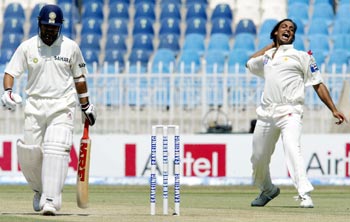
After a dismal series in Pakistan in 2006, there were questions whether Sachin Tendulkar was scared of fast bowling and his best days were past him.
When he took over as coach of the Indian team in 2005, Greg Chappell had remarked that Tendulkar would never again be his devastating self.
'I don't think he is ever going to be the player he was,' Chappell had declared.
The list of critics started growing after the disappointing outing in Pakistan, where the master batsman struggled against the Pakistan quicks, especially Shoaib Akhtar.
His decision to walk in Faisalabad after gloving Shoaib behind the stumps also raised eye-brows. Television replays suggested that he was not out, because his hand was off the bat when the ball struck it.
Former Pakistan captain Moin Khan suggested that the downhill journey for the little champion had started. In his column he declared, 'I fear this may just be the beginning of the end of Sachin Tendulkar.'